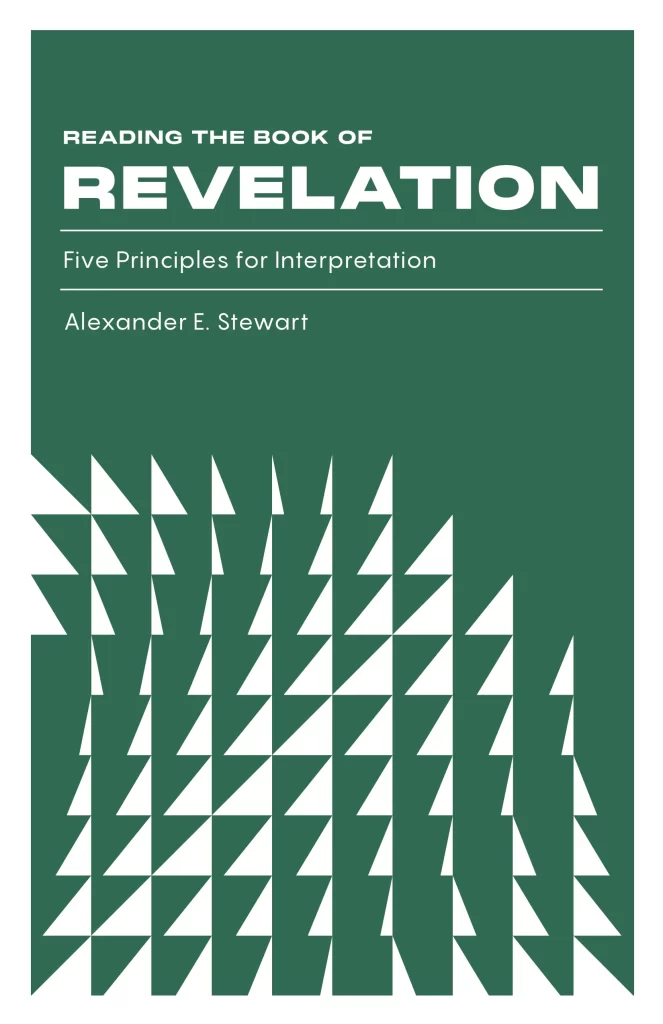
Reading the Book of Revelation: Five Principles for Interpretation
Dr. Alexander Stewart
Many students of the Bible have a difficult time interpreting the Book of Revelation. In this new publication, Dr. Alex Stewart has provided five key hermeneutical principles to help properly exegete this text. Readers will gain valuable tools to help them navigate the Book of Revelation and learn about other important resources to help them continue their studies.
I was deeply influenced many years ago through a conversation I had with a pastor. I was eagerly learning all I could about Revelation and trying to unravel its most complicated visions. I asked this pastor about the vision of a thousand years in chapter 20. Did he hold a premillennial, postmillennial, or amillennial position? He bluntly refused to answer the question. He was happy to spend time with me and talk about Revelation, but he refused to answer, even after I repeatedly asked him. He finally explained his reason, and although I can’t remember exact words, his meaning was clear enough: those (and similar) debates have seriously harmed attempts to gain a proper understanding of Revelation because they focus on minor and relatively unimportant issues while missing the real purpose and main point of the book. He was right.
Revelation is neither a complicated book of doctrine nor a detailed timetable of future events. Its primary goal is not to give precise information about events that will unfold right before the end of the world. This is not to say that Revelation does not contain theology or does not describe future events. It certainly does both, but neither is its primary purpose. Revelation is primarily a book of motivation.
Revelation fits within the genre of prophecy, but some confusion has crept in here because of different understandings of prophecy. For many people, any mention of prophecy immediately suggests information about the future. This is, of course, sometimes the case. Unfortunately, however, this misses the main point of most biblical prophecy. The Hebrew prophets in the Old Testament do not often give their hearers precise information about the future (although they do that occasionally). They more regularly call their hearers to repentance and faithfulness to their covenant with God to avoid God’s judgment and experience his blessing and salvation. John does the same thing.
John’s motivational purpose is made evident by an inclusio that frames the book, occurring near the beginning and end of John’s visions. An inclusio is a literary device used to mark off the beginning and ending of a section or entire book by repeating and emphasizing a key phrase or sentence. John employs an inclusio in Revelation 1:3 and 22:7.
“Blessed is the one who reads aloud the words of this prophecy, and blessed are those who hear, and who keeps what is written in it, for the time is near.” (Rev 1:3)
“And behold, I am coming soon. Blessed is the one who keeps the words of prophecy of this book.” (Rev 22:7)
The inclusio indicates that the words of the book are meant to be kept. How does one keep the words of Revelation? Many (most?) discussions and debates about Revelation focus on issues of the rapture, the antichrist, the great tribulation (Are you pre-trib., mid-trib., post-trib.?), the millennium (Are you amil., premil., postmil.?), the number of the beast, and the relationship of the church to Israel, but these debates shed very little light on how to keep the words of the book. When these debates become the main focus of attention, somebody is missing the point. Why would someone shine a spotlight on the stagehands rearranging props offstage instead of focusing on the actors actually performing a play? The props are important for setting the scene, but they are not what the play is about. The spotlight should always shine on the center of the action; in our case, we should always spotlight the main purpose of the book.
Keeping indicates action. Revelation was written to provoke and motivate a behavioral response. It was not intended simply to change how we think about certain theological ideas or provide us intellectual information about future events. It was written to change how we live and act in our day-to-day lives.
Taken from Reading the Book of Revelation: Five Principles for Interpretation © Copyright 2021 by Alexander E. Stewart. Published by Lexham Press, Bellingham, WA. Used by permission of the publisher. All rights reserved.
Read More

Reflections on the Bible Teaching Conference
Hear from attendees what they learned at the Bible Teaching Conference.

Hope in Suffering
Gateway student Matt Bodden is an evangelist who is ready to answer the question of suffering with the gospel.
Listen
Prophets | Haggai
The boys are back. And by boys we mean the Israelites. The people have returned to their land and after rebuilding their homes and the city walls, God pushed them to finally rebuild His temple. While probably not the most read book in the Bible, Haggai still contains

Prophets | Daniel Part 2
Now with the historical portion of Daniel done, Dr. Wegner takes us through the visions of beasts and years. All these figures intending to show us something. What does it all tell us about God?

Watch

Jonathan Edwards and the Asbury Revival
Chris Chun and Chris Woznicki discuss the signs of true revival, signs of the work of the Holy Spirit, and why it is important to critically assess the characteristics of revival in a spirit of charity.

Jonathan Edwards and the Baptists | Douglas Sweeney, Nathan Finn and Chris Chun
Dr. Douglas Sweeney and Dr. Nathan Finn joined Dr. Chris Chun for a panel discussion on Jonathan Edwards, recorded live at the SBC Annual Meeting in Anaheim.



